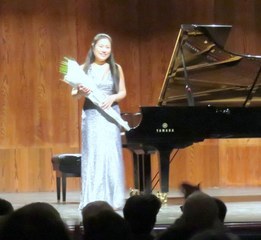|
Back
A Marathon On The Wild Side New York
Sylvia and Danny Kaye Playhouse, Hunter College
07/24/2015 -
International Keyboard Institute & Festival
Josef Haydn: Sonata in E Flat Major, Hob. XVI:52
Sergei Rachmaninoff: Sonata No. 2 in B Flat minor, Op. 36
Alexander Scriabin: Fantasie in B minor, Op. 28 – Vers la flame, Opus 72
Earl Wild: Sonata
Maurice Ravel: La Valse
Xiayin Wang (Pianist)

X. Wang at Kaye Theater (© Sam von Doggenstein)
Digitally speaking, Xiayin Wang has already climbed Everest and K-2, searching for even higher mountains to climb. Artistically, Ms. Wang, still in her mid-20’s has explored all seven continents of piano music, but finds that far too restricting for her endless curiosity.
The first time I heard her, those dazzling fingers surveyed Liszt and Prokofiev and Schubert, and then left the mainstream for a Liszt arrangement of Von Suppé’s Poet and Peasant Overture. Since that time, she has recorded three American piano concertos, a complete disc by Earl Wild and a whole record devoted to the great (but too rarely played) Richard Danielpour (including one major world premiere). This, alongside international recitals and performances, with recordings of relatively mainstream composers.
Last night, as part of Hunter College’s International Keyboard Institute and Festival, Ms. Wang played mainly to her stellar choices. Eschewing the paltry 19th Century, she played one Haydn sonata, then switched quickly to Rachmaninoff, Scriabin and Ravel. And for this listener, the great surprise of the evening, Earl Wild’s only Sonata.
Modest as her demeanor, Ms. Wang plunged into the theatricality of Haydn’s final sonata. Little was “classical” in this crazily experimental piece, and nothing was classical in Ms. Wang’s performance. In the first movement, she relished the strange key changes, the major chords leading to minor passages, and her rubatos and pauses were hardly Haydnesque. Her fortes were hammered out to fffs, the octave runs zipped along with bravura speed. The Adagio was hypnotic, until she came to that stark middle section, played with eerie mystery.
As for the finale, this was one of three toccatas played last night, each played with (what seemed like) sleight-of-hand. If it was blurred last night by the speed…well, it was the blur of an athlete too quick for an ordinary camera to capture. Haydn purists might have demeaned such a performance, but methinks Mr. Haydn would have been inspired to write even more sonatas for her.
One would have imagined Ms. Wang would have chosen the original Rachmaninoff Second Sonata, considered today almost unplayable. For her own reasons, she chose the revised shorter version, which, at least in the second movement, is far superior. Rachmaninoff tends to meander at times, and even Ms. Wang couldn’t quite get the structure right here, though she played with admirable limpidity. But the great crescendos of the first movement were taken with subtle power (with her personality, she probably wanted to be overly dramatic, but artistic prudence took over), and ended with those coruscating fingers doing their work.
One had no reservations for the second half of the program. The Scriabin early B Minor Fantasy was part romantic, part purposely erratic. Yet Ms. Wang could have felt closer to Vers la Flamme, both title and music going into strange corners to reach that flame. She played with a volition, an energy and a feverish crescendo leading to the finale lightning climax.
And now Earl Wild. Had he not been kidnapped by Arturo Toscanini as the official pianist of the NBC Orchestra, he would have been easily in the Horowitz halcyon. Wild still went his own way: charming to meet, dashingly handsome to the end, a master of classical and jazz, friend of everybody from Herbert Hoover to George Gershwin, and far beyond, openly gay (at his Carnegie Hall recital when he was 80 years old, Ned Rorem jumped on stage at the end with a gorgeous hug and kiss) and simply the best arranger of Gershwin ever.
Her one encore was Wild’s etude on Gershwin’s Etude, infernally difficult, but well known. The Sonata, which he wrote in 2000 at the age of 85, was new to me, and actually a major work. The opening March, was, like Rachmaninoff’s Alla marcia simply an excuse for technical challenges, amidst few jazzy nuances. The Adagio was pure smoky jazz, the jazz of the 1940’s, the jazz of Monk and Hawkins at their most intimate. And the finale, Toccata à la Ricky Martin) took the fingers through unheard of paces, with a few Latin intimations for its dedicatee. (Ms. Wild was never averse to flattering a pretty face.)
The last work was Ravel’s own arrangement of La Valse, which he probably couldn’t play himself. But Xiayin Wang (not to be confused with Yuja Wang, who also plays this) was not to be deterred. Her fingering was sometimes off, she sometimes sacrificed waltz tempos for dazzling lines, but only a crass writer would notice that. Like the rest of the recital, Ms. Wang played with drama, with high-speed theatricality, and–when necessary–true visceral artistry.
Harry Rolnick
|